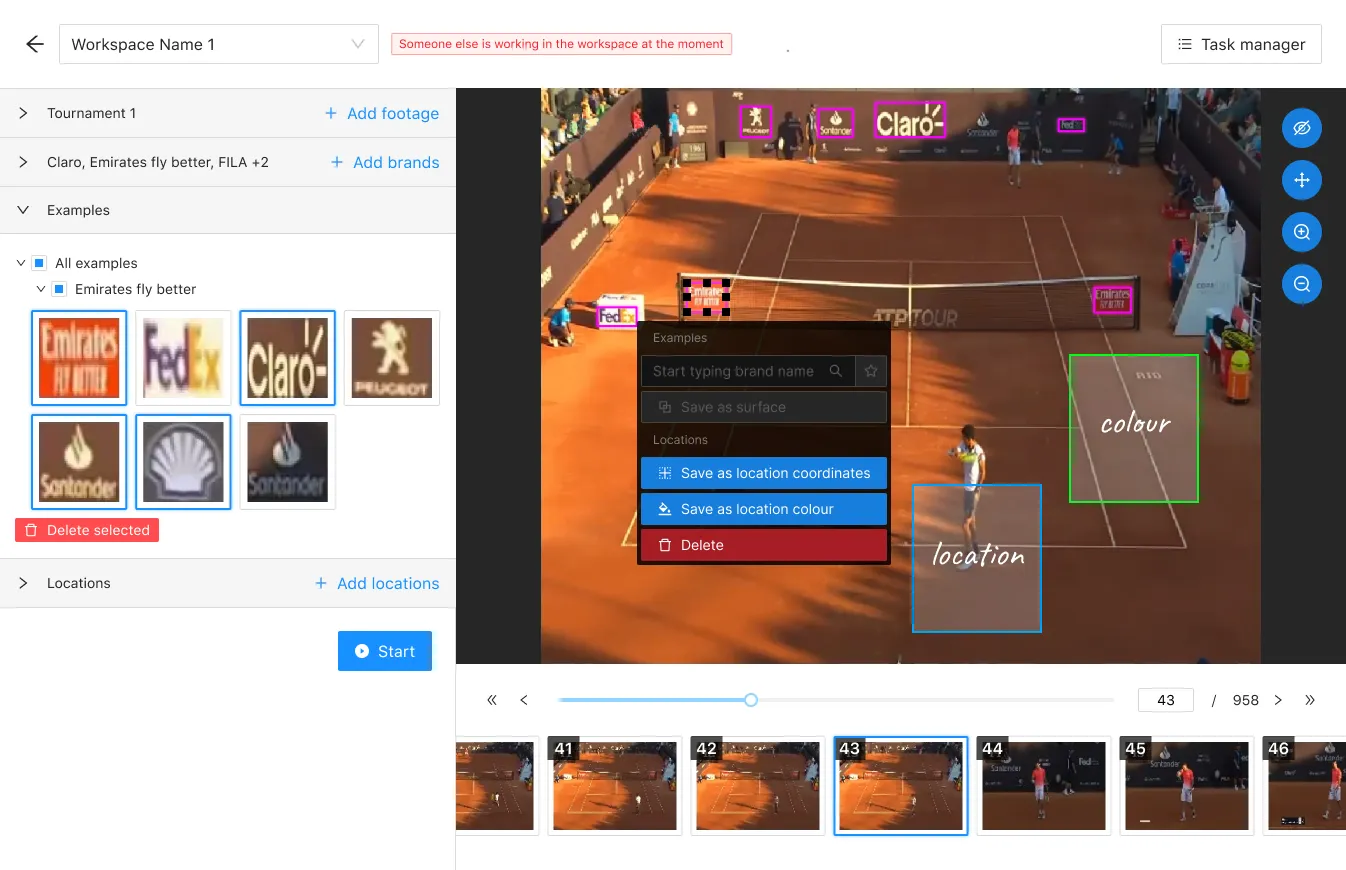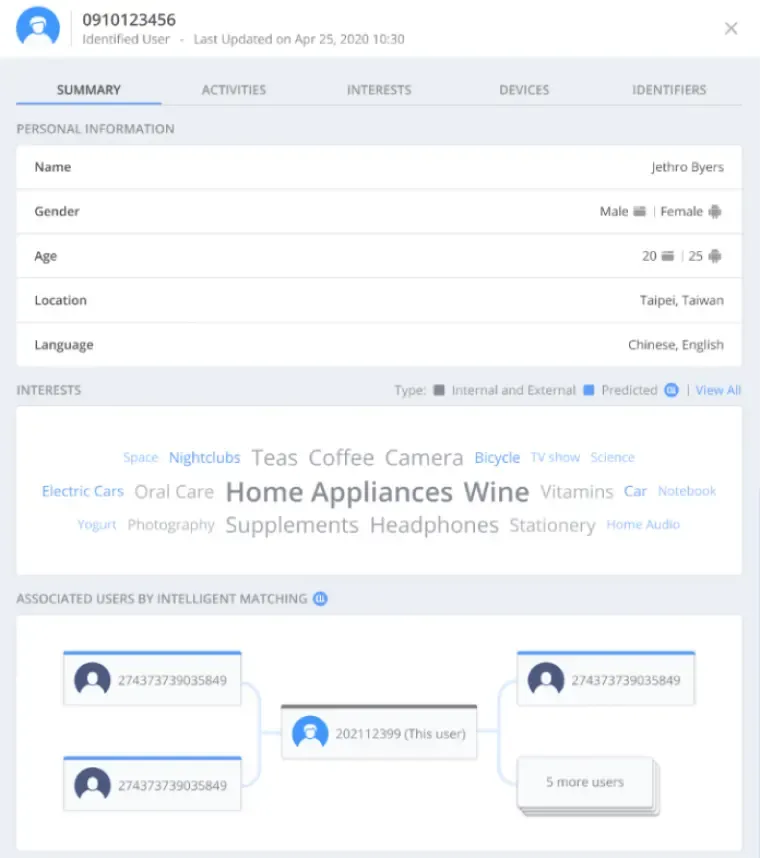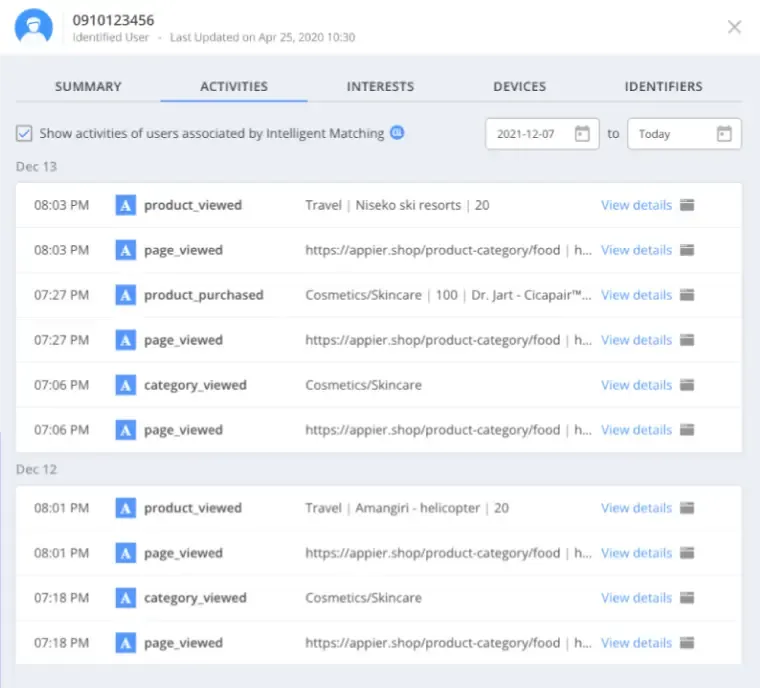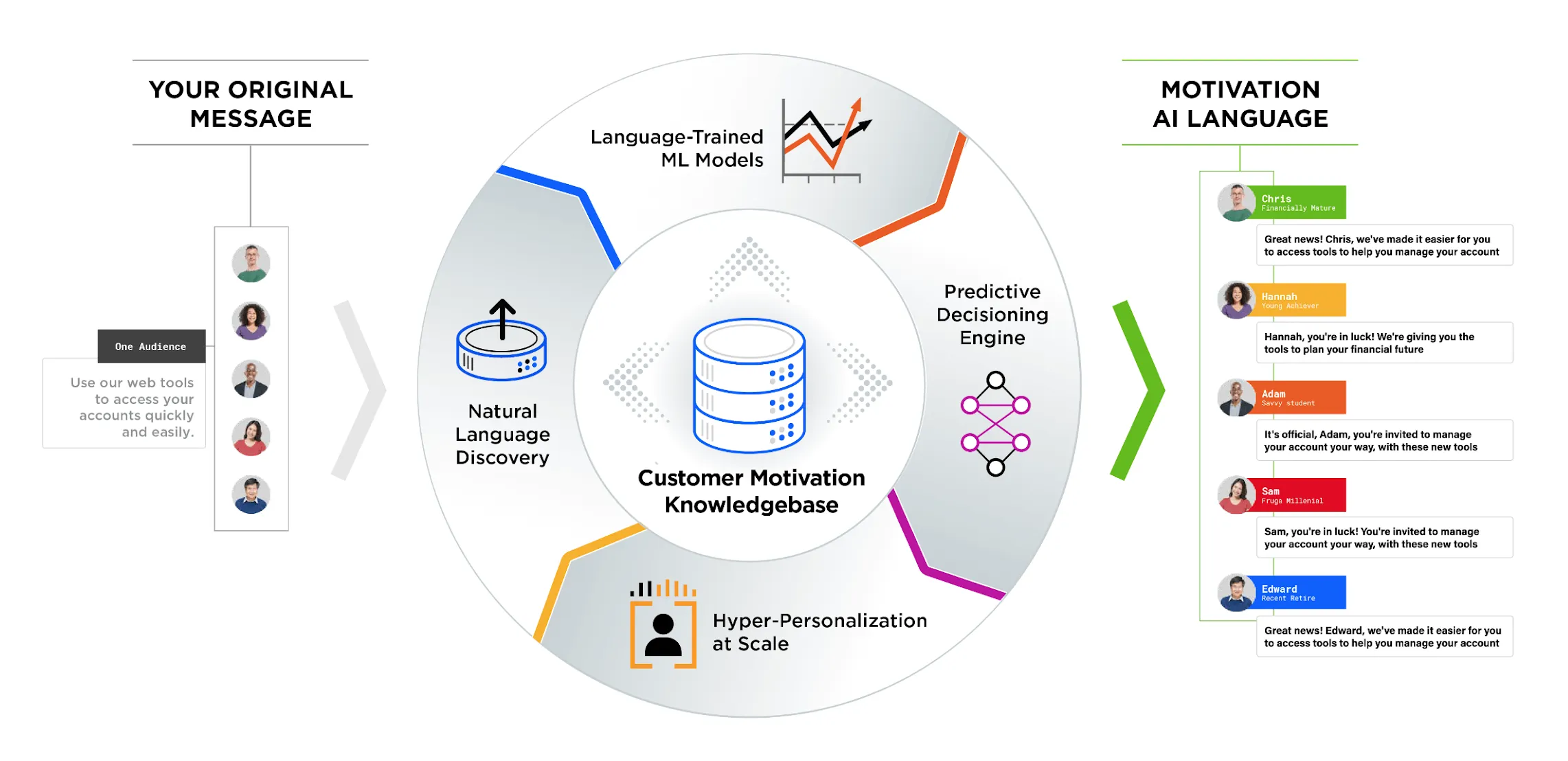Services
SERVICES
SOLUTIONS
TECHNOLOGIES
Industries
Insights
TRENDING TOPICS
INDUSTRY-RELATED TOPICS
OUR EXPERTS

April 25, 2025
of marketing organizations have fully implemented artificial intelligence or are experimenting with it
Salesforce
of organizations adopting AI in marketing aim to reduce time spent on repetitive tasks
Marketing AI Institute
of marketers surveyed reported that AI has already impacted their role
HubSpot
the potential increase in enterprise marketing productivity by 2029 thanks to GenAI adoption
IDC
Advanced marketing software typically uses machine learning algorithms to cluster customers into multiple segments based on shared characteristics, such as demographic (age, gender, etc.), psychographic (lifestyle, interests, etc.), geographic (country, region, etc.) and behavioral (purchase patterns, social media interactions, browsing history, etc.) data. After segmentation, the company can target each customer with personalized marketing messages promoting the service or product best suited to their segment to maximize the chances of engagement.
An alternative type of targeting, contextual advertising, involves displaying ads on websites based on their content rather than visitors’ personal traits. ML-powered marketing applications and advertising services can scan each webpage for specific keywords to identify its main topic and place ads with similar themes to each one. This can be a valid option to show relevant ads if visitors haven't consented to the use of cookies.
Popularized by ecommerce platforms like Amazon and streaming services like Netflix, ML-based recommendation systems are powerful engines providing tailored product or content suggestions based on user behavior, purchase history, product reviews, and other details.This helps customers navigate massive online catalogs and find the items they need, while allowing the adopters to increase sales and average order value.
Recommender engines are typically divided into three classes depending on the approach they take to provide recommendations. Systems adopting collaborative filtering suggest items purchased and rated positively by other users with comparable buying patterns. Engines using content-based filtering, on the other hand, recommend products similar to those already purchased by the customer in the past. Finally, hybrid systems combine the previous approaches to deliver personalized user experiences.
This concept refers to a set of tools and technologies, including machine learning (mostly its subset natural language processing), deployed to help marketing departments streamline customer interactions and manage time-consuming tasks. AI agents (mostly AI chatbots and virtual assistants) represent some of its major applications.
Marketers can use conversational AI solutions to gather personal information and customer feedback from website visitors and proactively engage them with automated and personalized messages (offers, product recommendations, reminders, etc.). Companies can also rely on advanced chatbots powered by generative AI for at-scale content creation, generating emails, landing pages, and other materials. Today’s popular CRM platforms, such as Salesforce and Microsoft Dynamics 365, feature chatbots and virtual assistants for customer engagement and content generation.
With the help of ML-powered solutions, content marketers can make their blog posts, case studies, and other materials more appealing to both their target audience and search engines. These tools analyze competitor content and search trends to identify popular topics and provide relevant content ideas, as well as suggest optimal keyword placement and headings to improve SEO ranking and boost traffic. Content optimization can even happen in real time, with machine learning systems dynamically adapting page layouts and topic coverage based on customer behavior (such as browsing patterns) and personal data (including reading preferences).
The advanced data analysis capabilities unlocked by machine learning prove extremely useful when it comes to tracking the performance of email marketing campaigns or other initiatives. ML solutions can easily identify key factors impacting your marketing KPIs and highlight potential optimization opportunities, for instance, to recommend more effective email send times and pre-headers.
At the same time, ML systems can analyze the role of different marketing channels (websites, social media, etc.), touchpoints (ads, blog posts, etc.), and advertising services (Google Ads, Meta Ads, etc.) throughout the customer journey, helping prioritize the most impactful ones for optimal marketing budget allocation. Moreover, dedicated machine learning algorithms can conduct sentiment analysis, processing textual information like social media content or website reviews to gauge the customers’ attitude towards the brand.
Machine learning has long found its way into customer analytics, thanks to the ability of ML algorithms to predict future business outcomes based on historical data (clients’ past interaction, purchasing habits, etc.). An example of ML for predictive modeling is customer lifetime value prediction. ML systems can forecast the total monetary value of each customer’s purchases throughout their relationship with your company, helping your marketing and sales teams prioritize high-value clients and engage them with regular communications.
Another popular application of ML in predictive analytics for marketing is churn prediction, which involves identifying customers at risk of ceasing to use your products or services to target them with tailored retention initiatives, such as personalized offers and coupons.
An event sponsorship valuation company teamed up with Itransition to develop a brand recognition system powered by neural networks. The machine learning solution can identify logos in sports-related images, such as photographs from tournaments, and generate reports detailing logo size, quantity, location (billboards, sports uniforms, etc.), and other metrics. This enables sporting event organizers and marketing agencies to assess brand performance and optimize their ad campaigns.

Image title: Configuring the brand recognition process
Data source: itransition.com — An ML solution for brand analytics and reporting
Luxury resort Turtle Bay partnered with market-leading CRM platform Salesforce to deliver personalized experience recommendations powered by Einstein, Salesforce’s built-in AI. The company adopted a combination of Salesforce products, including Data Cloud to gather guest data (booking history, resort interactions, etc.) and create customer segments, along with Marketing Cloud Personalization to suggest the best adventures for each guest. For instance, website visitors that book a certain activity via the guest console are offered personalized content promoting a snorkeling session or an excursion depending on their preferences. Thanks to Salesforce adoption, Turtle Bay Resort achieved a 40% increase in customer engagement.
Video title: Salesforce Einstein Personalization Demo
Data source: salesforce.vidyard.com
CommonWealth, one of Taiwan’s largest media outlets, implemented an ML-powered platform by Appier that helps brands increase customer engagement and acquisition. Appier’s machine learning model analyzes how visitors interact with CommonWealth’s website and application to derive accurate reader profiles in real time. Combining this data with additional information retrieved from the company’s CRM system, the platform delivers dynamically personalized ads. For instance, Appier’s AI engine managed to increase an ad’s CTR sixfold and reduce bounce rate by 30% simply by optimizing keywords.


Image title: Appier’s platform in action
Data source: appier.com — Aixon. Connect your data & predict user actions
A division of investment advisory firm Vanguard aimed to effectively engage clients looking for a retirement plan sponsor. Since this industry is highly regulated, the company could reach potential clients through a limited number of channels, such as LinkedIn. Vanguard turned to Persado to make marketing messages more personalized at scale. Persado’s ML-based platform uses NLP to determine the tone of voice of a brand’s content. It then tracks consumer behavior in response to various marketing messages, builds individual emotional profiles, and generates a hyper-personalized copy that will resonate with each client. Thanks to the solution, Vanguard was able to increase its division’s conversion rates by 15%.

Image title: Persado Motivation AI framework
Data source: persado.com — Persado Motivation AI Platform
Walgreens, the second-largest drugstore chain in the United States, adopted Clinch’s AI-powered ad personalization platform to drive traffic during allergy season. Since weather and pollen counts are a major trigger for allergies, Walgreens wanted to advertise its products when customers needed them most. Based on user locations and weather data, consumers in a specific area were targeted with dynamic ads and given a coupon for allergy medications. Based on local time, weather, user data and other parameters, Clinch’s machine learning-based platform personalized 160 ad variations based on location. As a result, Walgreens saw a 276% increase in CTR and a 64% decrease of each click’s price.
Image title: Weather-triggered advertising for Walgreens
Data source: clinch.co — Walgreens Provides Allergy Solutions Through Data-Driven Campaign
With ML-enabled marketing automation, companies can reduce operational costs and free marketers’ time for more value-added tasks.
Machine learning allows companies to generate more accurate consumer profiles, deliver personalized offerings at scale, and therefore increase customer satisfaction and loyalty.
The predictive capabilities of machine learning systems help companies anticipate emerging risks, such as customer churn, and respond accordingly.
Digital marketing specialists can leverage ML solutions to better assess customer needs and launch more effective ad campaigns, driving sales and achieving greater ROI.
Challenge | Potential solution | |
|---|---|---|
Data quality & accessibility |
Machine learning models require vast amounts of data for training. Therefore, it could be a challenge to
ensure that data from different sources, including sales management, marketing automation, and social media
solutions, is accurate and easily accessible for analysis.
| To ensure ML solutions have access to high-quality and relevant big data, you can implement several best practices:
|
Lack of expertise |
Leveraging machine learning for marketing purposes requires skilled ML and data science professionals.
However, not all companies have such expertise in-house.
| Mitigating the shortage of required expertise will require investments for:
|
ML model reliability |
Complex ML models can generate hard-to-interpret results. An unexplainable logic behind the solution’s
reasoning (the so-called black box problem) can impede trust and further technology acceptance.
| To ensure accuracy, interpretability, and transparency of the results provided by your ML solution, you can:
|
Security & compliance |
Marketing solutions, especially those powered by a data-driven technology like ML, typically store and
analyze a large amount of personal information. This makes them ideal targets for cyber attacks and can
raise concerns among policymakers and customers.
| To mitigate cyber exposure and prevent customer data misuse that can result in fines and reputational damage, you should:
|
Our team of consultants offers expert advisory to streamline your ML project, address emerging technical challenges, and maximize the adoption benefits of your ML-powered marketing solution.
We provide experienced ML developers and dedicated teams or handle your ML project end-to-end to help you build advanced marketing software and other solutions tailored to your business needs.
Marketing has always been about establishing meaningful connections with customers. While banking on technology to effectively interact with other humans can sound counterintuitive, machine learning is revolutionizing the delivery of engaging customer experiences at scale. Indeed, a growing number of companies are using machine learning's automation and analytics capabilities to support their marketing efforts and make more data-driven decisions.
Turn to Itransition’s engineers to harness the power of machine learning and increase customer engagement, attract more leads, and improve your company’s bottom line.

Insights
Explore key use cases and real-life examples of AI in social media, along with tools and guidelines to implement effective social media strategies.

Case study
Find out how Itransition’s dedicated team helped AiBUY release their innovative machine learning-driven shoppable video platform.

Insights
Discover top applications, real-life examples, and key trends of machine learning in ecommerce, along with some best practices to streamline its adoption.

Insights
Explore key applications, real-world examples, and benefits of machine learning in retail, along with best practices to facilitate its implementation.

Insights
Find out how supervised and unsupervised learning work, along with their differences, use cases, algorithms, pros and cons, and selection factors.
Services